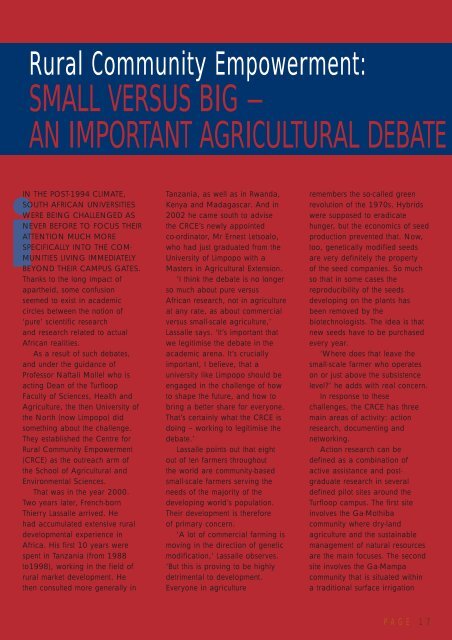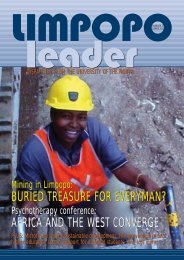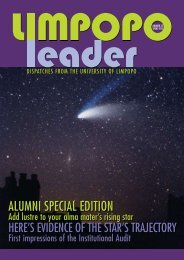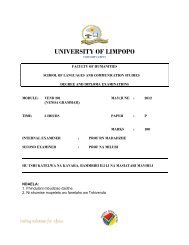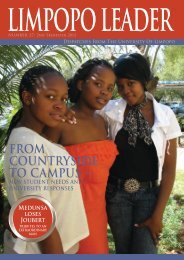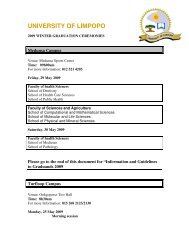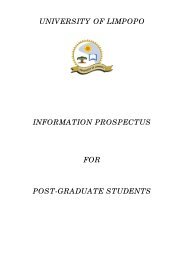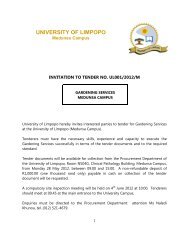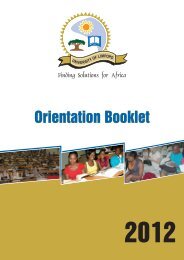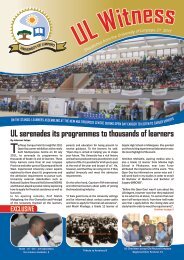Limpopo Leader - Spring 2005 - University of Limpopo
Limpopo Leader - Spring 2005 - University of Limpopo
Limpopo Leader - Spring 2005 - University of Limpopo
Create successful ePaper yourself
Turn your PDF publications into a flip-book with our unique Google optimized e-Paper software.
Rural Community Empowerment:<br />
SMALL VERSUS BIG –<br />
AN IMPORTANT AGRICULTURAL DEBATE<br />
iIN THE POST-1994 CLIMATE,<br />
SOUTH AFRICAN UNIVERSITIES<br />
WERE BEING CHALLENGED AS<br />
NEVER BEFORE TO FOCUS THEIR<br />
ATTENTION MUCH MORE<br />
SPECIFICALLY INTO THE COM-<br />
MUNITIES LIVING IMMEDIATELY<br />
BEYOND THEIR CAMPUS GATES.<br />
Thanks to the long impact <strong>of</strong><br />
apartheid, some confusion<br />
seemed to exist in academic<br />
circles between the notion <strong>of</strong><br />
‘pure’ scientific research<br />
and research related to actual<br />
African realities.<br />
As a result <strong>of</strong> such debates,<br />
and under the guidance <strong>of</strong><br />
Pr<strong>of</strong>essor Naftali Mollel who is<br />
acting Dean <strong>of</strong> the Turfloop<br />
Faculty <strong>of</strong> Sciences, Health and<br />
Agriculture, the then <strong>University</strong> <strong>of</strong><br />
the North (now <strong>Limpopo</strong>) did<br />
something about the challenge.<br />
They established the Centre for<br />
Rural Community Empowerment<br />
(CRCE) as the outreach arm <strong>of</strong><br />
the School <strong>of</strong> Agricultural and<br />
Environmental Sciences.<br />
That was in the year 2000.<br />
Two years later, French-born<br />
Thierry Lassalle arrived. He<br />
had accumulated extensive rural<br />
developmental experience in<br />
Africa. His first 10 years were<br />
spent in Tanzania (from 1988<br />
to1998), working in the field <strong>of</strong><br />
rural market development. He<br />
then consulted more generally in<br />
Tanzania, as well as in Rwanda,<br />
Kenya and Madagascar. And in<br />
2002 he came south to advise<br />
the CRCE’s newly appointed<br />
co-ordinator, Mr Ernest Letsoalo,<br />
who had just graduated from the<br />
<strong>University</strong> <strong>of</strong> <strong>Limpopo</strong> with a<br />
Masters in Agricultural Extension.<br />
‘I think the debate is no longer<br />
so much about pure versus<br />
African research, not in agriculture<br />
at any rate, as about commercial<br />
versus small-scale agriculture,’<br />
Lassalle says. ‘It’s important that<br />
we legitimise the debate in the<br />
academic arena. It’s crucially<br />
important, I believe, that a<br />
university like <strong>Limpopo</strong> should be<br />
engaged in the challenge <strong>of</strong> how<br />
to shape the future, and how to<br />
bring a better share for everyone.<br />
That’s certainly what the CRCE is<br />
doing – working to legitimise the<br />
debate.’<br />
Lassalle points out that eight<br />
out <strong>of</strong> ten farmers throughout<br />
the world are community-based<br />
small-scale farmers serving the<br />
needs <strong>of</strong> the majority <strong>of</strong> the<br />
developing world’s population.<br />
Their development is therefore<br />
<strong>of</strong> primary concern.<br />
‘A lot <strong>of</strong> commercial farming is<br />
moving in the direction <strong>of</strong> genetic<br />
modification,’ Lassalle observes.<br />
‘But this is proving to be highly<br />
detrimental to development.<br />
Everyone in agriculture<br />
remembers the so-called green<br />
revolution <strong>of</strong> the 1970s. Hybrids<br />
were supposed to eradicate<br />
hunger, but the economics <strong>of</strong> seed<br />
production prevented that. Now,<br />
too, genetically modified seeds<br />
are very definitely the property<br />
<strong>of</strong> the seed companies. So much<br />
so that in some cases the<br />
reproducibility <strong>of</strong> the seeds<br />
developing on the plants has<br />
been removed by the<br />
biotechnologists. The idea is that<br />
new seeds have to be purchased<br />
every year.<br />
‘Where does that leave the<br />
small-scale farmer who operates<br />
on or just above the subsistence<br />
level?’ he adds with real concern.<br />
In response to these<br />
challenges, the CRCE has three<br />
main areas <strong>of</strong> activity: action<br />
research, documenting and<br />
networking.<br />
Action research can be<br />
defined as a combination <strong>of</strong><br />
active assistance and postgraduate<br />
research in several<br />
defined pilot sites around the<br />
Turfloop campus. The first site<br />
involves the Ga-Mothiba<br />
community where dry-land<br />
agriculture and the sustainable<br />
management <strong>of</strong> natural resources<br />
are the main focuses. The second<br />
site involves the Ga-Mampa<br />
community that is situated within<br />
a traditional surface irrigation<br />
P A G E 1 7


